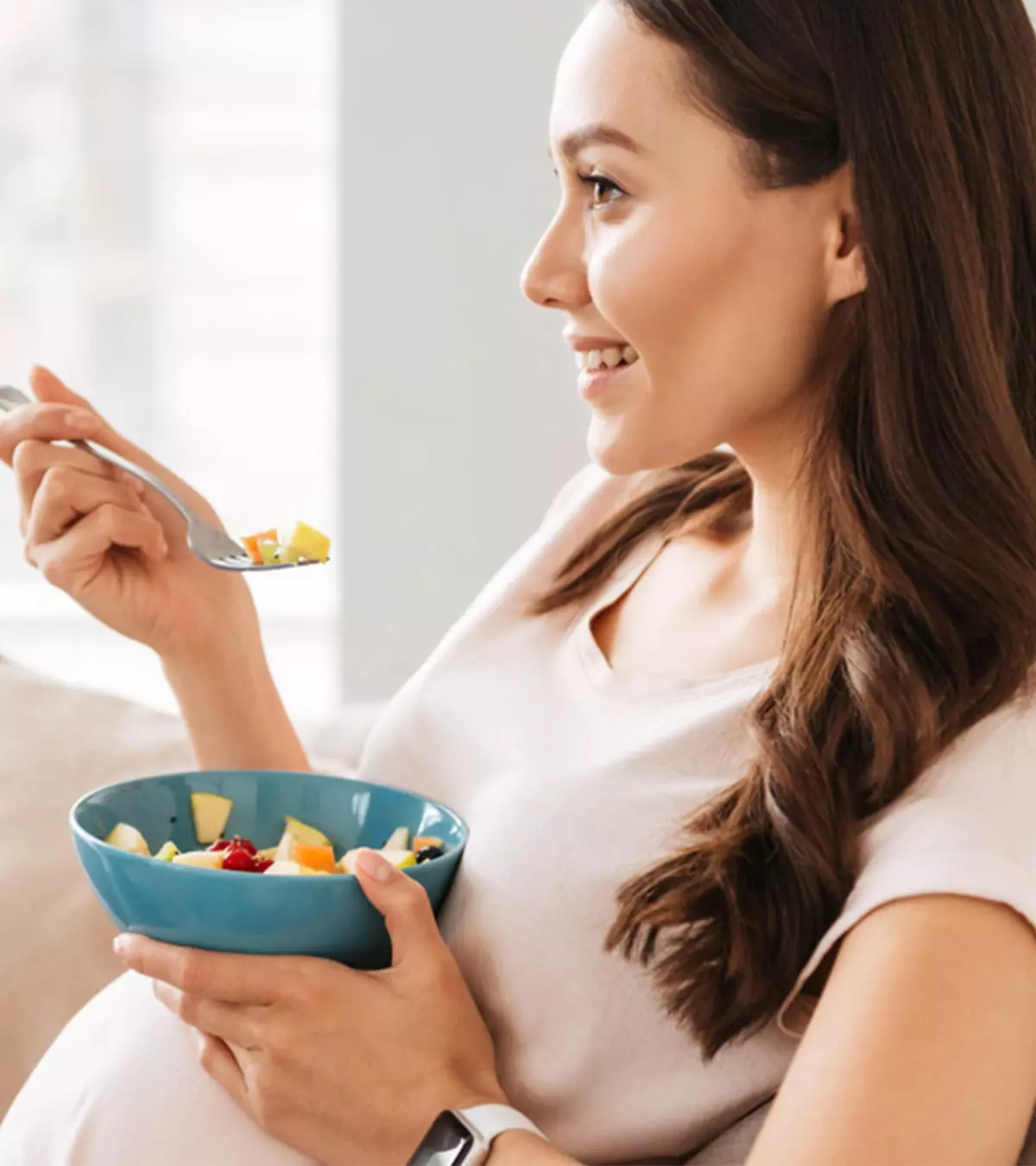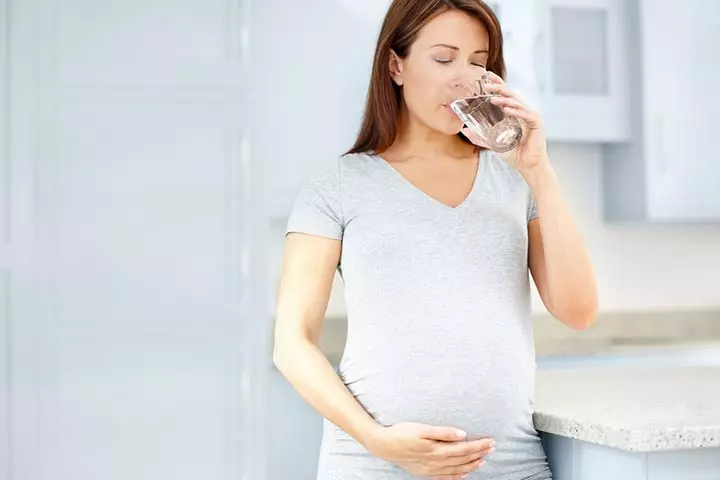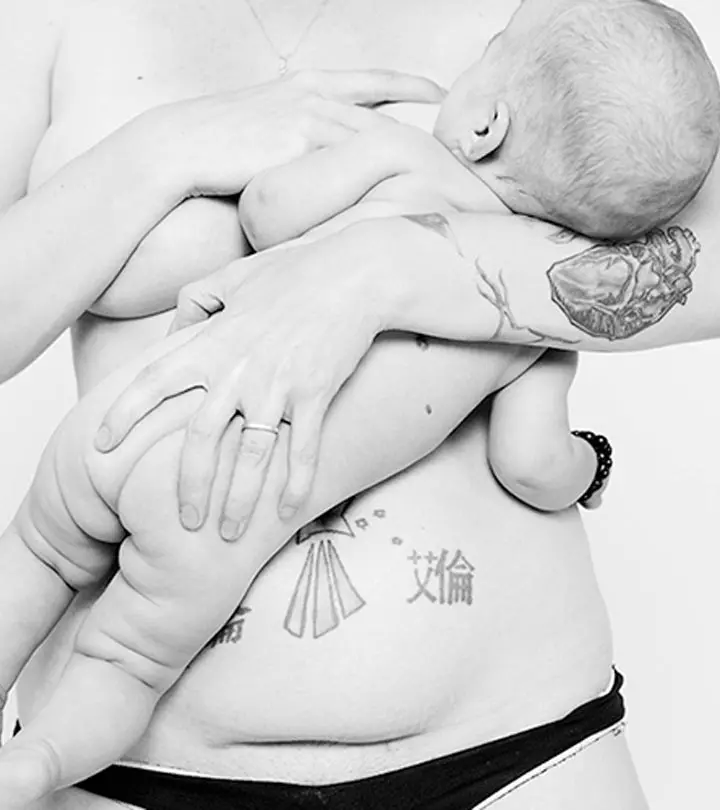
Image: Shutterstock
Have you ever heard of the pregnancy glow? Well, during pregnancy, your blood flow and circulation increase so much that it makes your skin look radiant and flushed. Your hormones are raging too, which can also contribute to that beautiful glow. But that is not all; your skin goes through a lot of other changes as well. We’re talking about stretch marks, dry skin, and sometimes, even rashes (1). By investing some time in self-care and skin care routine, you can keep a check on the issues while utilizing the advantage of the increased blood circulation.
You can work on the good health of your skin, and the best way to do that is by eating foods that contribute to skin health. The best part is that you won’t be only doing yourself a favor; your baby will thank you too, as it can impact your baby as well. So without further ado, let’s look at the best foods to eat during pregnancy that benefit your skin:
Kicking Acne To The Curb

Image: Shutterstock
You probably never had acne before, not even during puberty, but pregnancy might change all that. Women have complained of acne during pregnancy, so if you’re one of them, worry not. Make sure you include omega-3 fatty acids and vitamin C into your diet (2).
Omega-3 fatty acids are essential for treating acne because they have anti-inflammatory properties and can regulate the overproduction of sebum. Moderate sebum production is great as it keeps your face moisturized, but overproduction can cause clogged pores and acne. Foods rich in omega-3 fatty acids include fish, nuts such as walnuts, seeds such as flaxseeds and chia seeds, and plant oils such as canola oil and soybean oil (2).
There’s one thing you need to know — while fish has numerous benefits, you’ll have to take great care when choosing the kind of fish you will be eating. Fish such as salmon, anchovies, sardines, and herring are good during pregnancy, but avoid shark, king tuna, and swordfish. Talk to your doctor to understand what type of fish you are allowed to eat.
Vitamin C can help repair the scars caused by acne, as it promotes the formation of collagen. You can also include foods rich in vitamin C, such as citrus fruits, broccoli, blackcurrants, kiwi, and kale, in your diet (3).
Stretch Marks? Nip It In The Bud!

Image: Shutterstock
Stretch marks during pregnancy are kind of inevitable, but by treating them right at the start, you may be able to lessen their severity. You’ll most likely find stretch marks around your breasts and belly. This is a given, considering that your belly and breasts expand during pregnancy (4).
Eating foods that are rich in protein can help avoid and treat stretch marks. With adequate protein intake, your skin’s elasticity is increased, which in turn can prevent stretch marks. The amino acids present in protein can work wonders for skin elasticity as well. Some protein-rich foods include eggs, poultry, milk, cheese, nuts, tofu, and seeds (5).
Say “No” To Dry Skin And Rashes

Image: Shutterstock
If you’re looking for ways to treat your eczema and dry skin that has cropped up during your pregnancy, start with adding probiotics to your diet, such as yogurt and pickles. Foods rich in omega-6 fatty acids can help moisturize dry skin, so add a generous amount of safflower oils, walnuts, pumpkin seeds, flaxseed oils, and chia seeds. Studies have shown that safflower oil helps treat eczema. Anti-inflammatory foods such as spinach, apples, kale, and broccoli can help as well, mainly since they contain quercetin, which works as an antioxidant and anti-histamine (6), (7).
Make sure you include fruits and vegetables in your diet, as each contains nutrients that are beneficial for you. Don’t forget whole grains, as they too can help your skin. Whole-wheat cereals, whole wheat bread, and whole grains such as millet and quinoa are good sources of B-vitamins, fiber, iron, and selenium, increasing the elasticity of your skin, thereby preventing dryness and stretch marks (8), (9).
Complement Good Diet With Ample Hydration And Exercise Routine

Image: IStock
Proper nutrition is very important at each stage of our lives, more so during the pregnancy months. An important factor to our diets is the level of liquid intake. Failing to drink enough water regularly can lead to a host of problems. While on the other hand drinking a good amount of water daily would work wonders for the skin. After all, water intake helps get rid of the many toxins that accumulate in our bodies. So, take the time out to drink enough water. If you keep forgetting the daily intake or lose track of how much you’re drinking, get hold of a bottle with quantity markers. These bottles would inform you how much water you have drunk until now and thus provide accurate tracking.

Image: IStock
Another important element of healthy living is physical exercise. Workouts like yoga, cardio, weight training etc are very important to build a strong and resilient body. This is also very important for expecting mothers. Pregnancy and childbirth are tough times for women and require much body strength. From carrying the extra weight of the fetus for nine months to undergo the painful labor is no easy task. The core and back strength are vital elements to go through these times. If you’re entirely new to working out, it would be advisable to seek help from a professional in guiding you. As you know pregnancy is a time when you cannot exert yourself too much. Opt for exercises that provide slow and smooth transitions that slowly strengthen the body without any risks of injury. If your body is healthy, your skin will automatically glow too.
It’s essential to take care of your skin during pregnancy, as it can undergo several changes. Don’t forget to keep your skin hydrated with a good intake of water, and make sure you’ve added exercise to your daily regimen as well. It is also important to keep your doctor in the loop, so make sure you discuss any change in your diet with your doctor. Do you know of any foods for skin health that you swear by? Let us know in the comments below!
References
- Pregnancy and Skin
https://www.ncbi.nlm.nih.gov/pmc/articles/PMC4311336/ - Effect of dietary supplementation with omega-3 fatty acid and gamma-linolenic acid on acne vulgaris: a randomised double-blind controlled trial
https://pubmed.ncbi.nlm.nih.gov/24553997/ - Vitamin C in dermatology
https://www.ncbi.nlm.nih.gov/pmc/articles/PMC3673383/ - Stretch Marks
https://www.ncbi.nlm.nih.gov/books/NBK436005/ - Diet and Skin Aging—From the Perspective of Food Nutrition
https://www.ncbi.nlm.nih.gov/pmc/articles/PMC7146365/ - Omega-3 Versus Omega-6 Polyunsaturated Fatty Acids in the Prevention and Treatment of Inflammatory Skin Diseases
https://www.ncbi.nlm.nih.gov/pmc/articles/PMC7037798/ - Overviews of Biological Importance of Quercetin: A Bioactive Flavonoid
https://www.ncbi.nlm.nih.gov/pmc/articles/PMC5214562/ - Diet and Dermatology
https://www.ncbi.nlm.nih.gov/pmc/articles/PMC4106357/ - Discovering the link between nutrition and skin aging
https://www.ncbi.nlm.nih.gov/pmc/articles/PMC3583891/
Community Experiences
Join the conversation and become a part of our nurturing community! Share your stories, experiences, and insights to connect with fellow parents.












